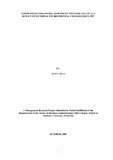| dc.description.abstract | The environment in which organizations operate changes constantly. Organizations are
expected to deal with competitive forces such as threats of new entrants, substitute
products, bargaining power of suppliers and bargaining power of customers in order to
remain in the market. In Kenya, SACCOs operate in a competitive environment since
liberalization of the economy in 1997. Mwalimu SACCO was chosen as a case study.
This study compared different strategies adopted by the SACCO since liberalization of
the country’s economy. The cooperative movement in Kenya faced numerous operational
challenges brought about by the negative effects of a dynamic economic and business
environment. The literature available indicated that there is no study aimed at addressing
the competitive strategies adopted by SACCOs in Kenya as a response to the emerging
changes hence the knowledge gap. It was found necessary to investigate the strategies
adopted for survival by the SACCOs because the cooperative sector is of great
significance to the economic development of this country as it employs thousands of
Kenyans and also provides credit facilities to their members.
Factors that are cited in literature as influencing competitiveness of an organization were
summarized and what come up were strategies that could be adopted as firms compete in
an industry. A total of nineteen management team members participated in the study.
The nineteen respondents were selected using random and purposive sampling.
Analysis of data was done using frequencies and percentages while findings were
presented in form of tables and figures. Research findings revealed different adoption
rates of different competitive strategies which included product differentiation, cost
strategy and focus strategy.
The recommendations made on ways of improving the SACCO’s competitiveness
included putting in place a broad research policy by the ministry of cooperative
development and employing enough staff, then distributing them according to the number
of cooperative societies throughout the nation. Where there are no primary cooperative
societies currently it is suggested that the government, through the MOCD&M should
either revive or create new primary cooperative societies.
Suggestions made for further studies were for future studies to attempt linking the
performance of cooperative societies with the strategies they adopted. | en |

